It started in a farm pickup truck. To be precise, on the truck’s dashboard.
Al Travis was born on a cotton farm in Batesville, Miss., to James and Mildred Travis in 1940 and rode many times in his dad’s truck, sometimes with his grandfather also in the cab.
He was about 6, he recalls, and he was playing on the dashboard as if it were a piano keyboard.
That was an omen of things to come.
“My grandfather said to my dad, ‘I think you need to get that boy a piano.’ Nobody in our family was a musician. So within a year, I was taking piano with our church organist and it took. My parents never had to say anything to me about practicing. That was in my DNA,” he said.
From Mississippi to Germany
Travis would go on to study at Oklahoma Baptist University — the choice was there or Baylor — then to Syracuse University in New York to get a master’s degree in music with an organ concentration. He met his future wife, Maureda Hanna, at OBU.
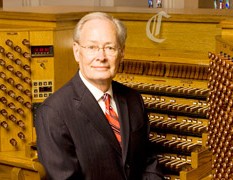
Al Travis
A German grant allowed him to spend a year in Frankfurt studying with Helmut Walcha, whom he described as a wonderful blind organist who was a great improviser.
“I learned a lot from him,” said Travis, himself a legendary improviser.
He returned to the United States to earn a doctor of musical arts degree with a concentration in organ from the University of Michigan in Ann Arbor.
A former student follows his footsteps
Travis was honored at a recent church service in recognition of his 41 years as organist at Broadway Baptist Church. The service also acknowledged the 25th anniversary of the installation of the Rildia Bee O’Bryan Cliburn Organ, the largest pipe organ in Texas and 12th largest in the United States.
The church’s new organist is Bradley Reznicek, and Travis said he considered Reznicek’s selection a gift since he is a former student.
“You have always been a welcoming and loving church family since we joined in 1978,” Travis said at that service. “Maureda and I have now been at Broadway for 43 years. Our hearts are full of gratitude for life-giving relationships with so many of you. We are profoundly grateful for all the ways Broadway has shaped our faith. We look forward to more good years ahead.”
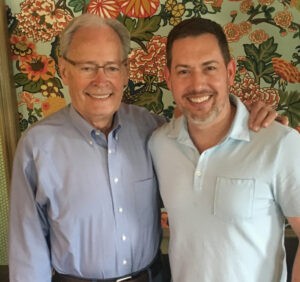
Al Travis and Bradley Reznicek
“I’ve known Bradley for over 20 years. I have always been impressed with his love for worship, hymn playing and improvisation,” Travis said. “He came to Southwestern Seminary shortly after the Cliburn Organ was installed (at Broadway). I had the privilege of working with Bradley as he completed his master’s degree in organ. He performed that recital here on the Cliburn Organ.”
A natural at the organ
Not long after the conversation in the pickup truck cab that led to the family purchase of a piano, Travis began taking lessons from the church pianist and organist at First Baptist in Batesville, Mamie Talbert. Four or five years later, she asked if he would like for her to show him how to play the organ.
“‘I can’t teach you, but I’ll show you how to play the organ,’” Travis recalled her saying. “I had already started playing the piano in church, some, on Sunday evening, when I was about 12. So she teaches me, shows me the organ. And within a year, I’m doing some playing of the organ on Sunday evening.”
And, he says, just like that, he loved it all.
He studied with Talbert until he was a sophomore in high school and then started with a teacher in Memphis, about an hour away. He studied with James Morrison, organist at Union Avenue Baptist Church, for two years before college.
During his extensive career, Travis staged and performed numerous hymn festivals and concerts across the United States and is a recognized expert in improvisation. He taught at Dallas Baptist University and Southwestern Baptist Theological Seminary’s School of Church Music.
The Broadway legacy
Broadway, a congregation known for high musical standards, has had only three organists since 1946.
“In most activities you either play the game or you sit on the bench. But there is at least one where you can sit on the bench and play. When this room was completed in 1952, and the $75,000 Casavant Organ was installed, Helen Massey Joyce sat at the bench,” said Royce Rose, chair of Broadway’s Personnel Committee. She already had served as Broadway’s organist for six years and continued for 26 more, retiring in 1975 as Helen Massey Joyce West.
Travis became the church’s organist in July 1978 and didn’t slide off the bench until 2019, 41 years later. He did change benches, however, leaving the old Casavant bench for the Rildia Bee O’Bryan Cliburn Organ bench.
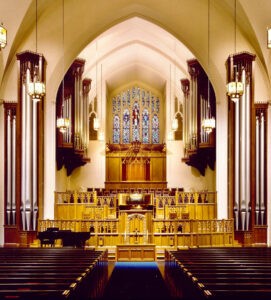 Travis has been recognized by peers, by faculty colleagues, choirs, musicians and fellow staff members of Broadway, by Fort Worth Symphony Orchestra members and by churches throughout the country where he has dedicated organs and led hymn sings, Rose said.
Travis has been recognized by peers, by faculty colleagues, choirs, musicians and fellow staff members of Broadway, by Fort Worth Symphony Orchestra members and by churches throughout the country where he has dedicated organs and led hymn sings, Rose said.
Rose said he was speaking for “the folks like me, often musically challenged. Folks who walk, wander or stumble into this room Sunday after Sunday, hurting, seeking, looking for solace from the world.”
“We find our seat and we listen as the organ voluntary invites us into the presence of God and our spirits are quieted and comforted,” he added. “We stand to join others in praise and petition as these 10,000 pipes stand beside us and support us.
“And then, as the benediction is given, Al takes the bench and the melodies of our worship that day are woven into a crescendo of praise. The organ falls silent. We all start breathing again. And we realize we are ready to walk back into that world carrying the love of Christ to others who hurt and seek and desire solace.”
A love for hymn festivals
Travis says he was never all that interested in being a concert pianist or organist. “That’s how I got into hymn festivals because, to me, they were more meaningful personally.”
Students he taught at the seminary would invite him to do a concert at the installation of a new organ, he explained. “I did a few of those and then I decided what interests me the most is doing a hymn festival.”
After all, the major reason for a church organ has to do with the singing of hymns.
“I started putting together hymn festivals to say to the congregation, ‘The main reason you bought this organ is to set a mood for worship, to encourage, to invite people to sing. So let’s focus on that right from the beginning.’ And that’s how I got into doing hymn festivals.” Travis said.
“The main reason you bought this organ is to set a mood for worship, to encourage, to invite people to sing. So let’s focus on that right from the beginning.”
How he got to Southwestern
After he finished his doctorate at the University of Michigan, he taught for nine years at Dallas Baptist College and also served as organist at First Baptist Church of Richardson, Texas. But he wanted to teach at the graduate level and was considering New Orleans Baptist Theological Seminary, where there was an opening.
Friends who taught at Southwestern Seminary in Fort Worth worked to bring him there instead, because the school’s organ teacher was on the verge of retirement. The seminary hired him a year early to keep him from going to New Orleans.
He also had heard that Broadway Baptist needed a new organist. In those days, many seminary faculty members also were members of Broadway, and so he applied and was hired in 1978.
Planning for a new organ
Even then, there already was talk about the need to replace or make substantial repairs to the original organ in the sanctuary.
The style in 1952 when the original organ was installed was to put the pipes in chambers not visible to the congregation. And the metal of the pipes was high in lead content.
“That’s the way they were building organs after the war, but a terrible way to build organs,” Travis explained. “European organs, they didn’t use lead like that. They used tin and zinc.”
“When I came, there were a lot of pipes that had begun leaning over.”
In the Texas heat, pipes with lead content in uninsulated and unairconditioned chambers suffered terribly.
“When I came, there were a lot of pipes that had begun leaning over,” Travis recalled. “They were tied up with little white strips of cloth.” Others had literally melted, sinking downward to form bulges at the base.
When the late Tom Stoker was minister of music, the discussion about the organ intensified.
Enter Van Cliburn
“Then Van Cliburn moved to town and he and his mother joined Broadway,” Travis said. “Of course, he got in on that conversation and finally joined on an advisory committee.
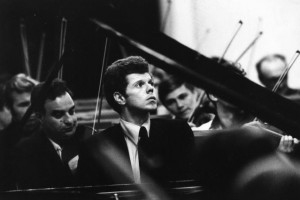
A young Van Cliburn performing
“And so we began talking with Casavant because we had gone to a lot of other organ companies, but we still felt that Casavant, at that point, since organ companies come and go with their high and low points, was the best organ company to go with. So we began talking to them and then it got really serious,” he said.
Money, of course, was an issue.
“And then I remember one cold winter evening, we were meeting with the organ committee, and Van and some few others. And Van just said, ‘What? Forget about the money, just what if we went for the maximum ideal organ for the space that we have in Broadway?’
“And remember that in Bass Hall, there’s not going to be an organ,” Cliburn noted, referencing the grand performance hall then envisioned for the revitalization of downtown Fort Worth, just blocks from the church. “Dallas just built the Myerson (Symphony Center), with a wonderful new organ to be showcased over there. So, let’s just ask Casavant to draw up plans for the maximum.”
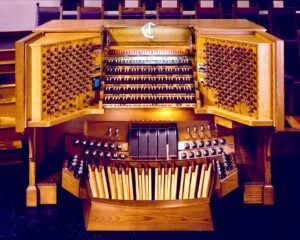 With Cliburn’s encouragement, the committee’s vision expanded. “Well, it grew, it was topsy,” Travis said. “One time it was 110 ranks, then, well, 120. Well, we need this for orchestra, 140. Wound up being 191 ranks. The largest pipe organ in Texas and one of the largest ones in the country, as far as church organs. So that’s how we got to that point.”
With Cliburn’s encouragement, the committee’s vision expanded. “Well, it grew, it was topsy,” Travis said. “One time it was 110 ranks, then, well, 120. Well, we need this for orchestra, 140. Wound up being 191 ranks. The largest pipe organ in Texas and one of the largest ones in the country, as far as church organs. So that’s how we got to that point.”
Some people assumed Cliburn paid for the organ, and it’s likely true that naming it after his mother was an incentive for some donations — and Cliburn himself did make what is described as a substantial gift.
“I think because it had the name Rildia Bee O’Bryan Cliburn people just thought, ‘Oh, the Cliburns gave this organ,’” Travis said. “We’ve spent years trying to re-channel that info.”
Fundraising for more than an organ
It was Broadway members and supporters who stepped up, pledging $2.75 million for the grand instrument.
At the same time, Broadway did something unusual if not unique. Under the leadership of then senior pastor Stephen Shoemaker, the church tithed on the money raised for the organ, dedicating $250,000 of the pledged amount to mission work in Fort Worth. More than 500 members made pledges.
Among the beneficiaries was the church’s Agape Meal program, where homeless people are invited to a sit-down dinner with china dishes on tablecloths and metal utensils with volunteers hosting tables and serving the meal family style.
Travis recalls a comment he thinks he heard from Shoemaker: “We will always have the unfortunate, and we will always have beauty. We are going to try to have both of those here at Broadway.”
History of improvisation
During his tenure on the bench at Broadway, Travis was known for creating improvised postludes that incorporated the themes of that day’s service. Asked if he actually improvised or planned the postludes in advance, he replied: “Sometimes.”
Recall that he began taking piano lessons at age 7.
“By four, five years later, I was listening on Sunday afternoons to two radio programs, Billy Graham, because I loved the way his pianist kind of improvised introductions for the congregation to sing. That was 30 minutes. And then I would listen to the Old Fashioned Revival Hour,” Travis said.
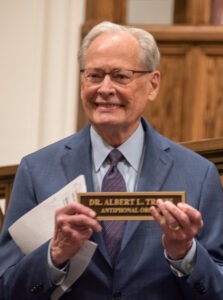 The Revival Hour aired nationally from 1937 to 1968, and the pianist was Rudy Atwood, who died in 1992. Atwood’s style differed from the pianist on the Billy Graham program.
The Revival Hour aired nationally from 1937 to 1968, and the pianist was Rudy Atwood, who died in 1992. Atwood’s style differed from the pianist on the Billy Graham program.
“He was a more flashy, a virtuoso kind,” Travis recalled. “I listened to those every Sunday because then I would go to church on Sunday night and the music director or the preacher would say, ‘OK, Al, what hymns are we going to sing tonight?’ And they were hymns I had heard on the radio. And I’d gone to the piano to try to change them. So I was improvising from early on. I loved that.”
Travis could play by ear, much to the dismay of his piano teacher, who wanted to make sure he could read music.
“Some students say, ‘Well, just play it for me,’ to the teacher, ‘Just play it for me and I’ll get it,’” he said. But she wouldn’t do it.
“That’s not the way to learn music. Not really. So it was just natural. And I loved to do that, and I still love it. It’s just something about that creative something that’s just in my genes.”
How he got to Southwestern
Travis came to Southwestern Seminary in 1978 when Russell Dilday was inaugurated as president.
“Golden years, ’78 until the late ’80s,” he said. “And then the Baptist world starts falling apart and he’s fired, locked out of his office. And that was a dark, dark time for me personally, for the music school, for the whole world that I’d grown up in.
“I’d been in church since I was born and my whole life revolved around the church and being a Baptist. I would say those were the lowest, or some of the lowest, points in my life.”
It eventually was not possible for a Southwestern Seminary faculty member to be a member at Broadway. Travis left the seminary faculty in 2008 but remained at Broadway.
Dilday served 16 years as Southwestern’s president, from 1978 to 1994. His firing was part of the so-called “conservative resurgence” orchestrated in the Southern Baptist Convention by Paul Pressler and Paige Patterson, who later became president at Southwestern.
With the shift away from more traditional Baptist doctrines and toward a more fundamentalist approach in the SBC, it eventually was not possible for a Southwestern Seminary faculty member to be a member at Broadway. Travis left the seminary faculty in 2008 but remained at Broadway.
A former student follows in his foot pedals
During his time teaching at Southwestern, however, Reznicek was one of his students.
A mutual acquaintance introduced them. Reznicek played for Travis, who was impressed with both his skills and with his attitude about the importance of church music. “So I gladly accepted him as a student and enjoyed the two years he worked on his master’s,” Travis explained. “That was after we got the new organ, so then I was teaching at least the organ majors (at Broadway). He had his training on this organ, so he knows it well, or better than a lot of people.”
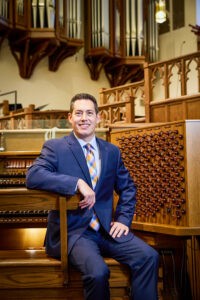
Bradley Reznicek
Travis says Reznicek has an innate sense about improvisation, Travis’ passion. “He loves this organ. And he’s going to grow. He’s just in his early 40s.”
Reznicek said he is honored to succeed “my dear friend and mentor, Al Travis, who served this wonderful church for 40 years.”
“My affiliation with Broadway dates back to graduate studies with Dr. Travis. During that time, the church graciously opened its doors for practice, lessons and recitals on the Casavant. I gained great knowledge of the organ during that time and by accompanying concerts of the Seminary Chorus and the Fort Worth Symphony held at Broadway Baptist Church,” Reznicek said.
Praise from his church
As he steps off the bench, Broadway leaders are effusive in their praise of Travis.
“It has been a pleasure and truly an honor for me to have worked with Dr. Al Travis in the ministry of music at Broadway Baptist Church over the past several years,” said Michael Cox, Broadway’s director of music ministry. “He has generously shared his gifts in leading worship services at the organ with great sensitivity and unique artistry.
“His ability to improvise and pace a worship service with such impeccable musical taste has been a constant source of inspiration to me, to the Chancel Choir, as well as to the entire congregation. So many services would conclude with his personal arrangement incorporating the hymns of the day, bringing an added and profound meaning to the worship experience.”
Senior Paster Ryon Price concurred: “Dr. Travis is the true gentleman musician. His sensitivity and touch are well known throughout the organ community across the country and even the world. A long time ago, Al’s teacher, Russell Saunders, told Al, ‘Never play one note you don’t mean.’ In 40 years of ministry, Al never did.”
Travis has a number of compositions to his credit with Toccata on Rejoice, Ye Pure in Heart a favorite, especially at Broadway. There could be more, he says, but “I’m just not so fast at writing all my stuff out.”
During the process of selecting a new organ as the committee was visiting different churches to hear their organs, he would the play the Toccata as a comparison piece. Harriet B. Harral, who along with Travis are the only living members of that committee, recalls that was the high point for her of the process.
She and her husband asked that Travis play this favorite piece at their daughter’s wedding — full volume. He did so, and when he hit the first chord some of the babies in the audience started crying.
“Adults have almost cried too sometimes,” Travis said. “That’s been the most widely liked and accepted piece I’ve ever written. I’ve played it for many hymn festivals.
“I would say that piece was inspired,” he added. “I mean, it just kind of came out of me and flowed. But then on my first sabbatical, I took that piece to Gerry Hancock in New York. He was a huge inspiration, and he took that piece and he said, ‘You need to add a little more to this toccata,’ which I did with him, some more musical kind of things. It really enhanced the piece. So I owe him some of that, but wherever I go, if anybody’s ever heard a piece of mine, that’s the piece they request.”
Hear Al Travis play an improvision on Praise My Soul, the King of Heaven.
Hear Al Travis play an improvised prelude on Easter Sunday 2019 at Broadway Baptist Church.
Paul K. Harral, a member of Broadway Baptist Church in Fort Worth since 1987, is a retired journalist. He and his spouse, Harriet B. Harral, are both deacons and choir members and she was the first female chair of the board at the church. She also is a member of the board of Baptist News Global.
Related articles:
Broadway organist Al Travis honored
Friends say faith came first for Cliburn
Live from Fort Worth, it’s a more global church than ever before

